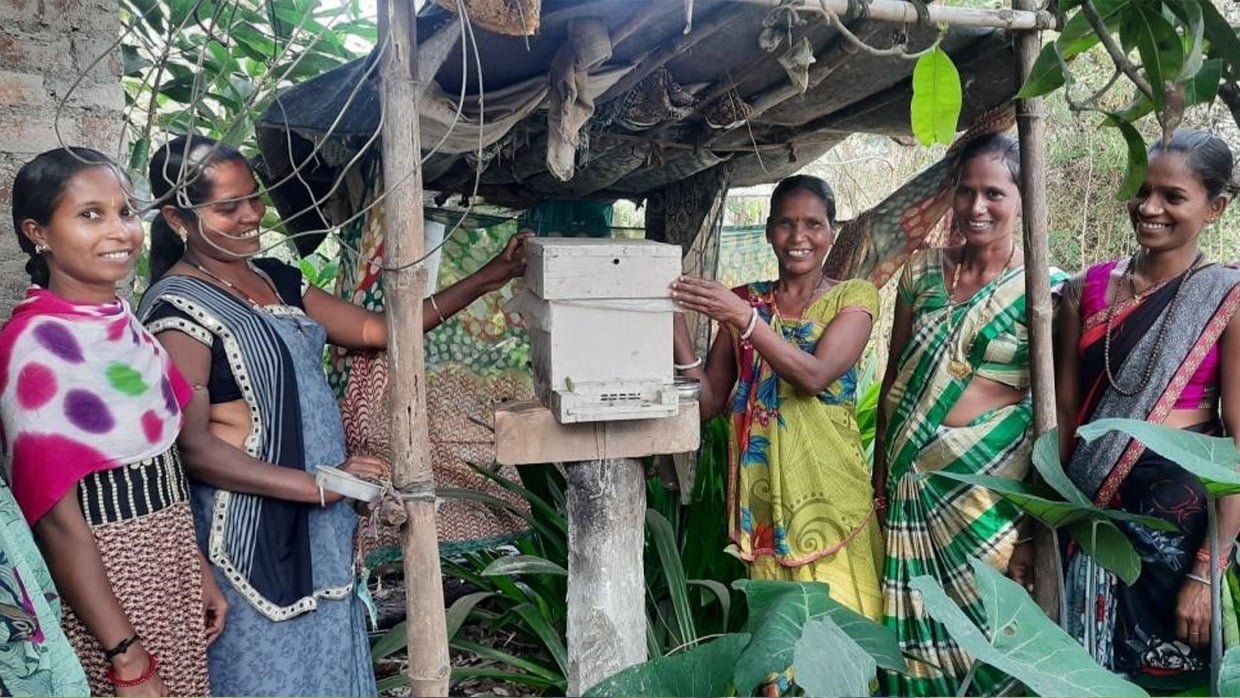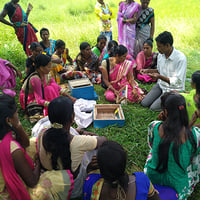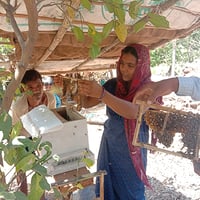Empowering women in India with the help of the humble honeybee

Did you know that many types of food require bees to help them grow? Most fruits, vegetables, pulses and oilseeds are heavily reliant on bees to pollinate the plants from which they grow. Honeybees are the most important among all pollinators and they play a crucial role increasing agricultural productivity.
Although agriculture supports more than half of India’s population, the price which farmers are paid for their produce is often only 25% of the retail price. 86% of India’s farmers practice rain fed subsistence agriculture on less than two hectares of land. This situation makes it difficult for many farming families to make ends meet.
Beekeeping to increase crop yields

We’ve been supporting Under The Mango Tree Society (UTMT Society) through Stop Hunger since 2019. UTMT Society is a non-profit organization in India and Stop Hunger is a global non-profit network acting against hunger which we support. UTMT Society provides training for farmers on beekeeping in an environmental-friendly, sustainable way and has been working to support female farmers from different villages in India, around Maharashtra and Gujarat.
Female farmers are approached by UTMT Society and given a free bee box if they agree to complete a training program. Practical knowledge and training are important to ensure that the bee-boxes are healthy. The training program can take up to 3 years to complete, with weekly training sessions in the first year and monthly training sessions in the two subsequent years.
Beekeeping can enhance agricultural yields by 30 – 60%, surplus crops can translate in to improved food security for the household as well as cash earnings from crops sold. After a year an additional income stream can be created from the sale of honey and beeswax.
Improving rural incomes with diversification
The bee box project has also created a new business opportunity for other women in the villages. Women without land have the option to become master trainers in beekeeping, travelling around neighboring villages to share their knowledge.
To offset the negative impact of the Covid pandemic, families have also been provided with boxes of seeds, enabling them to plant kitchen gardens and have better access to vegetables all year around.
So far, 897 farmers, 490 of which are women, have enrolled in the training program across 22 villages. 37 women have been trained as master trainers and a beekeeping resource centre has been established for meetings and training sessions.
Honeybees can increase crop yields by 50%

One farmer who has benefited from the bee box program is Manjulaben from Murdad village in Gujarat. Manjulaben and her family grow millet, rice, pulses, vegetables, groundnuts, mango and cashews on the 4 acres of land they own. They sell any surplus produce to earn Rs. 30,000 annually. They decided to participate in the beekeeping training program out of curiosity.
After a year of keeping her bee boxes in her mango orchard, the annual output of mangoes increased by 50%, providing the family with an extra income of Rs.12,000 from the sale of mangoes.
Manjulaben has also been able to extract 5.5 kgs of honey from her bee boxes and has sold 4kgs of honey for Rs. 1,600. She’s been able to use the extra income to buy seeds. Manjulaben has been selected as a master trainer for Mudad village. She will be able to coach other women in her village in bee keeping and is proud of the respect that this role commands.
With the help of humble honeybees, many more families can be supported in this way.
Why focus on the empowerment of women?
Stop Hunger has the key priority of empowering women, because women are proven to be the most effective in eliminating hunger in the communities around the world which are most in need.
The figures are clear: providing women with better education, training, means of production and financial resources will maximize the possibility of eradicating hunger from the world.
For example, did you know that...
- Up to 150 million more people would be fed if women had access to the same resources as men. Women constitute half of the agricultural workforce in developing countries. If women had the same access as men to productive resources, they could increase their farm’s production by 20 to 30%.
- On average, when women manage the household budget, they spend up to 90% of it on food, health care and education for their families, compared with only 30% for men. A child has a 20% greater chance of surviving if the mother controls the family budget.
- In too many countries, women leave school at an early age. But statistics show that just 2 extra years in school can bring salaries up by near 25%.
Despite the progress made to date, women make up 50 percent of the global population and 40 percent of the global workforce, yet only own 1 percent of the world’s wealth.
We’ve got a long way to go.
Find out more about…Stop Hunger






